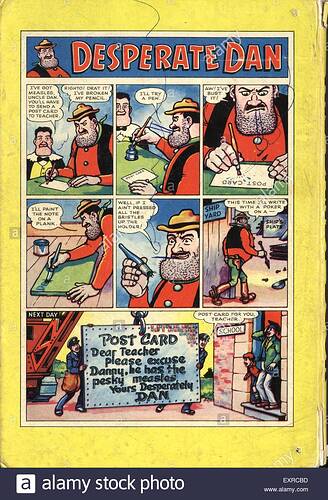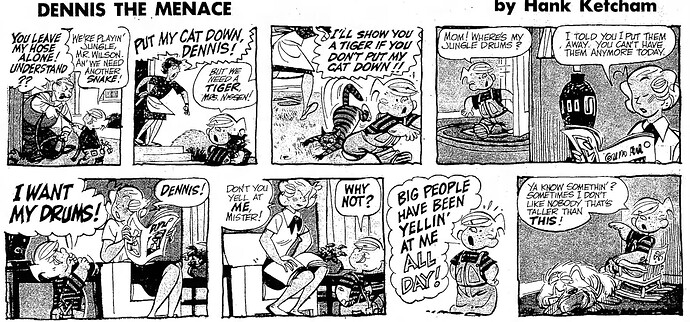Oh, no! Although I’ve never read the books, I really liked the tv series. She created a fantastic character. I’ll have to find some of her books.
That one made it onto television over here, but it was just called Dennis.
Weird, I wonder why?
I remember it being enjoyable enough, but not fantastic.
Probably because of the Dennis the Menace and Gnasher comic mentioned earlier.
Ah… could be!
Yep, that’s definitely it. Interestingly, the UK Dennis the Menace debuted March 12, 1951. The American Dennis the Menace also debuted on March 12, 1951. Believe it or not, this was entirely coincidental. They have no other common bond other than the name and the date of their debut. Because both became very popular, the American Dennis the Menace is just titled Dennis in the UK, while the UK Dennis the Menace is titled Dennis and Gnasher in the US. It’s just one of those extremely weird coincidences which may or may not represent a glitch in the Matrix.
Ah! Thanks for digging that up!
I’ve always thought that the dynamic between US and British culture was interesting… seems like there is lots of overlap sometimes on stuff like this. Strikes me that the US and UK were looking at childhood and tweenhood in similar ways in the postwar period.
There was a competing comic to The Beano called The Dandy. It featured a character named Desperate Dan who was the world’s strongest man and came from Texas. It came out in 1937.
Here’s an example episode, in which Dan’s nephew is suffering from the measles, but unlike modern Texas they have the good sense not to send him to school.
That’s funny… ![]()
It was friendly competition, since both the Beano and Dandy were owned by DC Thompson and the bigger characters would occasionally cross over into the other comics stories.
I haven’t seen the early US Dennis comics, but I hope they aren’t that similar as UK Dennis was a bully until around the 1990s. His usual victim, Walter, was queer coded until the late 80s when he becomes more devious and manipulative.
I just meant in terms of that period of youth being seen as a period of volatility and breaking away from one’s family in some way. The whole concept of teen years being a new understanding of how people develop… if you haven’t read it, this is worth reading…
I think Dennis was mostly a thorn in the side of adults and isn’t necessarily a bully…although bullying is often understood as just a “natural” part of the tween/teen years. Of course, only some of us got bullied, but that’s what we get for being “weird”… it’s especially aimed at queer kids as you note… but it’s all this new narrative of childhood to adulthood that became mainstream in the postwar period. This seems especially true of the west and the anglophile world.
Did not know that!
Good writer, and apparently a good person in general.
I love the series, too. Essie Davis was The Perfect Actress to play her, too. Look for the one Miss Fisher movie that was also made.
The books are fantastic. Ms Greenwood told a great story about creating/meeting Miss Fisher, which IIRC is part of the intro to the first book.
RIP
If it helps, her final Phryne book is in the editing stages, and will be published later this year.
And her wizard has found the manuscript for her autobiography, and there’s talk that that will be finished off as well.
That’s great!
A longtime friend of mom’s brought me two big paper shopping bags fulla Miss Fisher books! YAY!
And, Dave Allen from Gang of Four and Shriekback, too…
The local alt station just played Shriekback and that was way… I wonder if they’ll play Blondie later? ![]()
The American Dennis is probably closer to Bart Simpson, except his trouble making is less intentional. He’s definitely never been a bully. He’s more just not very careful and doesn’t think before he acts. And he has no filter on what he says. This comic from the 60s is pretty representative.
I read a little bit of the American Dennis The Menace when i was a kid, not a ton but i always got the impression that he was a scamp/rascal rather than a bully. In Spanish the character/comic name translates to Daniel El Travieso, Travieso meaning rascal which tracks for me.








